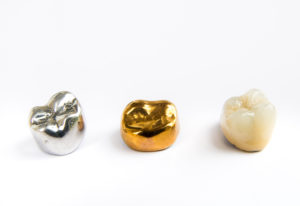July 7, 2018
Your Guide To Caring For Your Dental Crowns in Johnson
 Have you had any teeth that have been badly damaged by large cavities, fractures or other injuries? If so, you’ve probably had a crown placed to restore the tooth’s strength, function and appearance. Just like your real teeth, dental crowns in Johnson require basic care and maintenance to help them last as long as possible. No matter how well your crown has been done initially, your habits will have a big impact on its longevity. So how can you care for your dental crowns, both in the short-term and the long-term? Keep reading to find out!
Have you had any teeth that have been badly damaged by large cavities, fractures or other injuries? If so, you’ve probably had a crown placed to restore the tooth’s strength, function and appearance. Just like your real teeth, dental crowns in Johnson require basic care and maintenance to help them last as long as possible. No matter how well your crown has been done initially, your habits will have a big impact on its longevity. So how can you care for your dental crowns, both in the short-term and the long-term? Keep reading to find out!
How Should You Care For Your Temporary Crown?
Each dental crown is done in two visits. At the first, your tooth is prepared and impressions are taken so that the molds can be sent to the dental lab. Then it usually takes the lab about 1-2 weeks to make your permanent crown.
During that time, you’ll have a temporary crown covering your tooth. Here are some guidelines for caring for it:
- Wait a few hours before eating – It’s a good idea to wait until your numbness has worn off to eat so you don’t bite your cheeks, lips or tongue.
- Floss carefully – When you bring floss in between your temporary crown and the adjacent tooth, don’t pull it back out the same way. Instead, pull it through (horizontally instead of vertically) so you don’t accidentally dislodge the temporary crown.
- Call immediately if the temporary comes off – You can minimize the risk of this happening by avoiding hard, sticky or chewy foods. But if your temporary still winds up coming off, schedule an appointment right away to have it put back on.
- Rinse with salt water – If you have any gum irritation or sensitivity, gently swish with warm salt water several times a day to soothe the tissues.
How Can You Maintain Your Permanent Dental Crown?
Permanent crowns also need some extra care to maintain them and keep them feeling great.
First, it’s not uncommon to experience some temperature sensitivity in the weeks after getting a crown. This is usually because the tooth’s nerve has been aggravated and should be temporary. Using a sensitivity toothpaste will typically alleviate these symptoms.
Also, while the crown itself won’t get a cavity, the strip of exposed tooth structure near the gumline still can. Good brushing and flossing will keep this area clean and prevent a cavity from forming underneath your new crown. You can also use a fluoride mouthwash for extra cavity protection.
Finally, even though dental crowns are incredibly strong, they can still be fractured the same way that natural teeth can. Avoid chewing on anything hard like ice or hard candies to minimize this risk.
With these tips and tricks, you can look forward to many years of good oral health from your new dental crown!
About the Author
Dr. Don Chaney has almost 20 years of experience as a general, cosmetic and restorative dentist in Johnson. In that time, he’s done countless dental crowns to restore the strength and function of his patients’ damaged teeth with great success. If you have any questions, he can be reached via his website or at (479) 435-6400.
No Comments
No comments yet.
RSS feed for comments on this post.
Sorry, the comment form is closed at this time.


